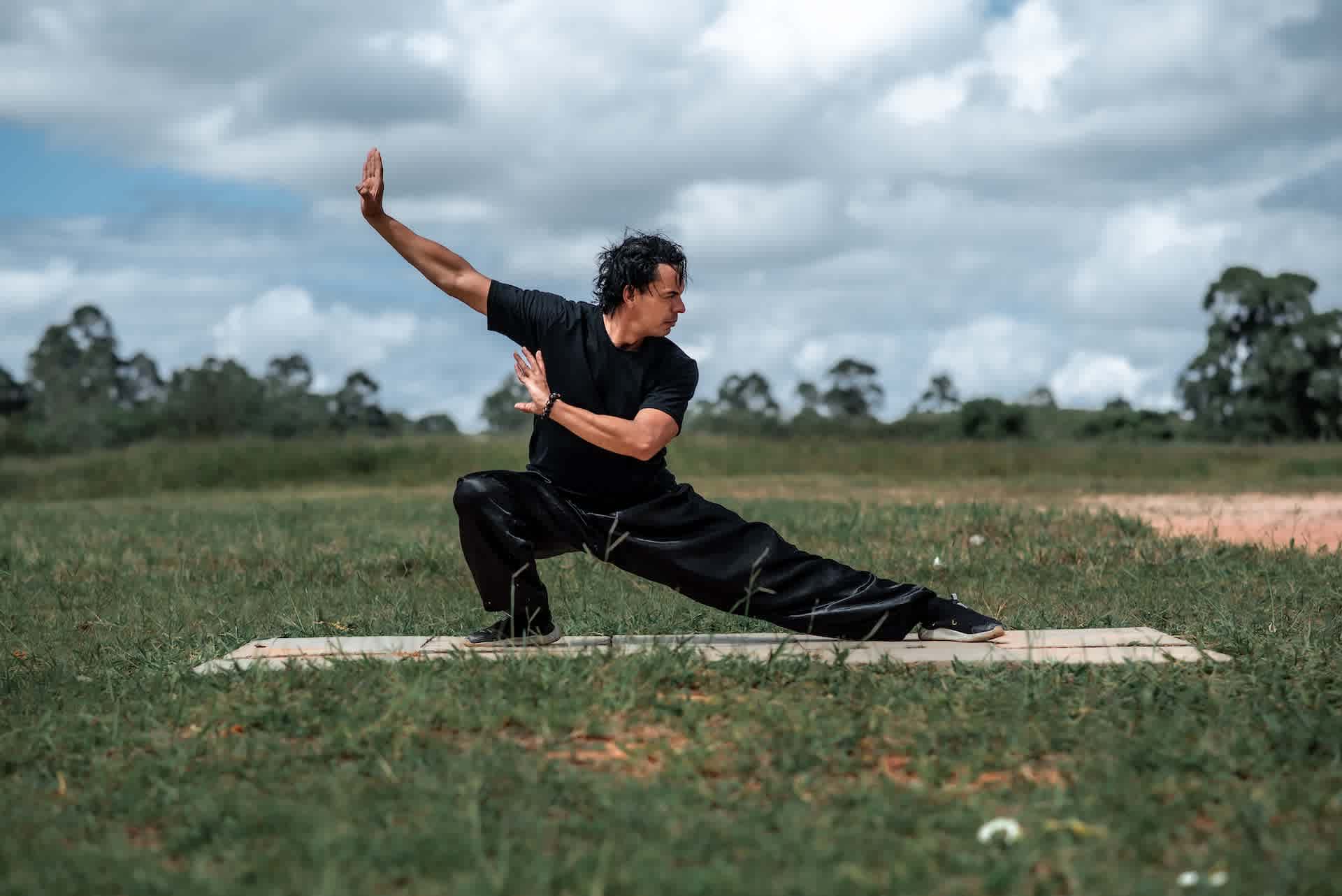Learn / Tai Chi for Addiction Recovery
Tai Chi for Addiction Recovery


April 27th, 2023| Clinically Reviewed by
Key Points
- Tai Chi is an ancient martial art that promotes physical and mental health.
- It relieves chronic pain, reduce stress, and strengthens the mind-body connection.
- It can help reduce cravings, and connect you with community during addiction recovery.
Tai Chi is an ancient martial art. Today, you can also use it as a complementary therapy in addiction treatment. Like any other form of gentle exercise, it can help you stay physically healthy during recovery. What’s more, a growing body of evidence shows that Tai Chi can improve your mental health. Many luxury rehabs offer Tai Chi to help clients reduce stress, practice mindfulness, and begin to heal the relationship between their minds and bodies.
What is Tai Chi?
Tai Chi began as a Chinese martial art.1 Over time, it’s grown into a type of mindful movement that promotes physical health. While it’s often taught to small groups, you can also practice Tai Chi on your own.
Compared to some other martial arts, Tai Chi is gentle2 and non-combative. It combines slow movements with mindful breathing and meditation. In most classes, practitioners flow smoothly from one pose to the next instead of sparring with each other. To a casual observer, this type of movement can look a lot like dancing.
What Are the Physical Health Benefits of Tai Chi?
Tai Chi is a highly accessible form of exercise. It’s safe for people of all ability levels,3 you can practice it anywhere, and its fluid movements improve strength and flexibility. For people in addiction recovery, some of Tai Chi’s physical effects are especially important.
Decreases Blood Pressure
Consistently practicing Tai Chi can reduce your blood pressure.4 This makes it a powerful treatment for clients recovering from alcohol addiction, which is a risk factor for high blood pressure.5 As your body continues to heal, Tai Chi can help you find a new normal.
Improves Circulation
Data shows that practicing Tai Chi for at least a year greatly improves blood circulation.6 Cycling fresh blood and oxygen throughout the body keeps your brain healthy,7 your organs working smoothly, and your immune system strong. For those in recovery, this boost in circulation can help your body repair damage caused by long-term substance use.
Relieves Chronic Pain
Tai Chi can alleviate chronic pain8 associated with several conditions, including fibromyalgia, arthritis, tension headaches, and osteoporosis. Because of the correlation between chronic pain and addiction,9 this is often important during recovery.
In particular, data implies that chronic pain makes people more vulnerable to opioid addiction. If that’s your experience, you’ll learn safer ways to manage your pain during rehab. If you find Tai Chi helpful, it can become part of your ongoing plan of care.
Reduces Stress
Tai Chi is more than a form of physical exercise. This mindfulness practice also improves mental health and relieves stress.10 And because stress has a direct impact on physical well-being,11 this can be extremely important in early recovery.
Without proper support, stress makes you more vulnerable to addiction.12 But sustainable, fulfilling outlets like Tai Chi help you manage stress in the long term. If you find it helpful, you can continue practicing this martial art long after you leave rehab.
How Does Tai Chi Help With Addiction?
Experts agree that Tai Chi can help with addiction recovery.13 It’s most effective as a complementary approach, alongside treatments like talk therapy or medication.
Promotes Sleep
Good sleep is foundational to addiction recovery.14 Getting enough sleep regulates stress hormones and helps your body heal. However, many people with addiction also have insomnia or other sleep disorders. This is especially common during early recovery.
Data shows that Tai Chi improves sleep15 habits, which can in turn improve cognitive function. It also boosts your energy levels, making it easier to participate in therapy.
Reduces Impulsiveness and Cravings
Your desire to use drugs or drink may never entirely disappear. But in rehab, you’ll learn healthy ways to cope with cravings if and when they arise. Studies show that tai chi improves impulse control,16 which can help you maintain sobriety in every stage of recovery.
Because Tai Chi also reduces cravings,17 you experience fewer triggers. Researchers note that the spiritual aspects of Tai Chi are essential here. As one study explains, mindfulness empowers people in recovery to have “an aware reaction rather than an automatic response” to difficult situations.
Strengthens the Mind-Body Connection
Like other complementary therapies, Tai Chi strengthens the connection between your mind and body.18 And that mindfulness can help you resist the desire to take drugs or drink. You’ll learn to accept your feelings just as they are, instead of trying to fix or change them. This improved self-awareness can help you stay grounded even when you face triggers and other challenges.
Connects You With Community Support
Addiction can be isolating. Because Tai Chi is usually taught in small groups, it invites you to connect with your peers. And building community in rehab can be a very important part of healing.
Over time, your peers in Tai Chi class can become a strong support network. According to one study, “tai chi may have a significant impact on social support19 as a result of the shared group experience and group motivation components.”
How to Find a Rehab That Incorporates Tai Chi Into Your Treatment Process
Tai Chi is a holistic approach to addiction recovery. This practice promotes mindfulness and general well being. In conjunction with traditional treatments, it can be a powerful way to work through the symptoms of addiction.
If you’re interested in supplementing your addiction recovery with Tai Chi classes, search for luxury rehabs that offer Tai Chi to find the right center for your needs.
Frequently Asked Questions About Tai Chi for Addiction Recovery
How does Tai Chi help with addiction?
Tai Chi can help with addiction recovery as a complementary approach, alongside traditional treatments like talk therapy or medication. Tai Chi promotes good sleep, reduces impulsiveness, strengthens the mind-body connection, and connects people with community support. These benefits can improve overall mental and physical health and support long-term recovery from addiction.
What are the mental health benefits of Tai Chi?
Tai Chi is a form of mindfulness practice that can help you manage stress and improve your overall mental well-being. It can improve your cognitive function, while also reducing cravings that may arise in early recovery. Tai Chi can help you become more self-aware and better equipped to resist triggers and other challenges.
How can I find a rehab that incorporates Tai Chi into my treatment process?
If you’re interested in incorporating Tai Chi into your addiction recovery, search for luxury rehabs that offer Tai Chi classes. These holistic practices can be a powerful way to work through addiction symptoms alongside clinical approaches.
-
“Tai Chi.” Smithsonian National Museum of Art. https://asia.si.edu/learn/for-educators/teaching-china-with-the-smithsonian/videos/tai-chi/
-
Tai Chi - an Overview | ScienceDirect Topics. https://www.sciencedirect.com/topics/medicine-and-dentistry/tai-chi. Accessed 18 Apr. 2023.
-
Tai Chi - an Overview | ScienceDirect Topics. https://www.sciencedirect.com/topics/medicine-and-dentistry/tai-chi. Accessed 18 Apr. 2023.
-
Tsai JC, Wang WH, Chan P, Lin LJ, Wang CH, Tomlinson B, Hsieh MH, Yang HY, Liu JC. The beneficial effects of Tai Chi Chuan on blood pressure and lipid profile and anxiety status in a randomized controlled trial. J Altern Complement Med. 2003 Oct;9(5):747-54. doi: 10.1089/107555303322524599. PMID: 14629852.
-
Ferdinand KC. Substance Abuse and Hypertension. J Clin Hypertens (Greenwich). 2000 Jan;2(1):37-40. PMID: 11416624.
-
Song QH, Xu RM, Shen GQ, Zhang QH, Ma M, Zhao XP, Guo YH, Wang Y. Influence of Tai Chi exercise cycle on the senile respiratory and cardiovascular circulatory function. Int J Clin Exp Med. 2014 Mar 15;7(3):770-4. PMID: 24753776; PMCID: PMC3992421.
-
Nystoriak MA, Bhatnagar A. Cardiovascular Effects and Benefits of Exercise. Front Cardiovasc Med. 2018 Sep 28;5:135. doi: 10.3389/fcvm.2018.00135. PMID: 30324108; PMCID: PMC6172294.
-
Kong LJ, Lauche R, Klose P, Bu JH, Yang XC, Guo CQ, Dobos G, Cheng YW. Tai Chi for Chronic Pain Conditions: A Systematic Review and Meta-analysis of Randomized Controlled Trials. Sci Rep. 2016 Apr 29;6:25325. doi: 10.1038/srep25325. PMID: 27125299; PMCID: PMC4850460.
-
NIDA. 2021, April 13. Part 2: Co-occurring Substance Use Disorder and Physical Comorbidities. Retrieved from http://nida.nih.gov/publications/research-reports/common-comorbidities-substance-use-disorders/part-2-co-occurring-substance-use-disorder-physical-comorbidities on 2023, April 18
-
Wang, Fang, et al. “The Effects of Tai Chi on Depression, Anxiety, and Psychological Well-Being: A Systematic Review and Meta-Analysis.” International Journal of Behavioral Medicine, vol. 21, no. 4, Aug. 2014, pp. 605–17. Springer Link, https://doi.org/10.1007/s12529-013-9351-9.
-
“Stress Effects on the Body.” Https://Www.Apa.Org, https://www.apa.org/topics/stress/body. Accessed 18 Apr. 2023.
-
Sinha R. Chronic stress, drug use, and vulnerability to addiction. Ann N Y Acad Sci. 2008 Oct;1141:105-30. doi: 10.1196/annals.1441.030. PMID: 18991954; PMCID: PMC2732004.
-
Cui J, Liu F, Liu X, Li R, Chen X, Zeng H. The Impact of Qigong and Tai Chi Exercise on Drug Addiction: A Systematic Review and Meta-Analysis. Front Psychiatry. 2022 Mar 8;13:826187. doi: 10.3389/fpsyt.2022.826187. PMID: 35350423; PMCID: PMC8957847.
-
Chakravorty S, Vandrey RG, He S, Stein MD. Sleep Management Among Patients with Substance Use Disorders. Med Clin North Am. 2018 Jul;102(4):733-743. doi: 10.1016/j.mcna.2018.02.012. PMID: 29933826; PMCID: PMC6289280.
-
Zhu D, Dai G, Xu D, Xu X, Geng J, Zhu W, Jiang X and Theeboom M (2018) Long-Term Effects of Tai Chi Intervention on Sleep and Mental Health of Female Individuals With Dependence on Amphetamine-Type Stimulants. Front. Psychol. 9:1476. doi: 10.3389/fpsyg.2018.01476
-
Liu S, Li L, Liu Z, Guo X. Long-Term Tai Chi Experience Promotes Emotional Stability and Slows Gray Matter Atrophy for Elders. Front Psychol. 2019 Jan 30;10:91. doi: 10.3389/fpsyg.2019.00091. PMID: 30761046; PMCID: PMC6364563.
-
Wang, M., Chen, Y., Xu, Y. et al. A Randomized Controlled Trial Evaluating the Effect of Tai Chi on the Drug Craving in Women. Int J Ment Health Addiction (2022). https://doi.org/10.1007/s11469-022-00917-8
-
Zhu D, Jiang M, Xu D and Schöllhorn WI (2020) Long-Term Effects of Mind-Body Exercises on the Physical Fitness and Quality of Life of Individuals With Substance Use Disorder—A Randomized Trial. Front. Psychiatry 11:528373. doi: 10.3389/fpsyt.2020.528373
-
Koren Y, Leveille S, You T. Tai Chi Interventions Promoting Social Support and Interaction Among Older Adults: A Systematic Review. Res Gerontol Nurs. 2021 May-Jun;14(3):126-137. doi: 10.3928/19404921-20210325-02. Epub 2021 May 1. PMID: 34039148; PMCID: PMC9836824.
Return to Resource Library
Our Promise
How Is RehabPath Different?
We believe everyone deserves access to accurate, unbiased information about mental health and addiction. That’s why we have a comprehensive set of treatment providers and don't charge for inclusion. Any center that meets our criteria can list for free. We do not and have never accepted fees for referring someone to a particular center. Providers who advertise with us must be verified by our Research Team and we clearly mark their status as advertisers.








